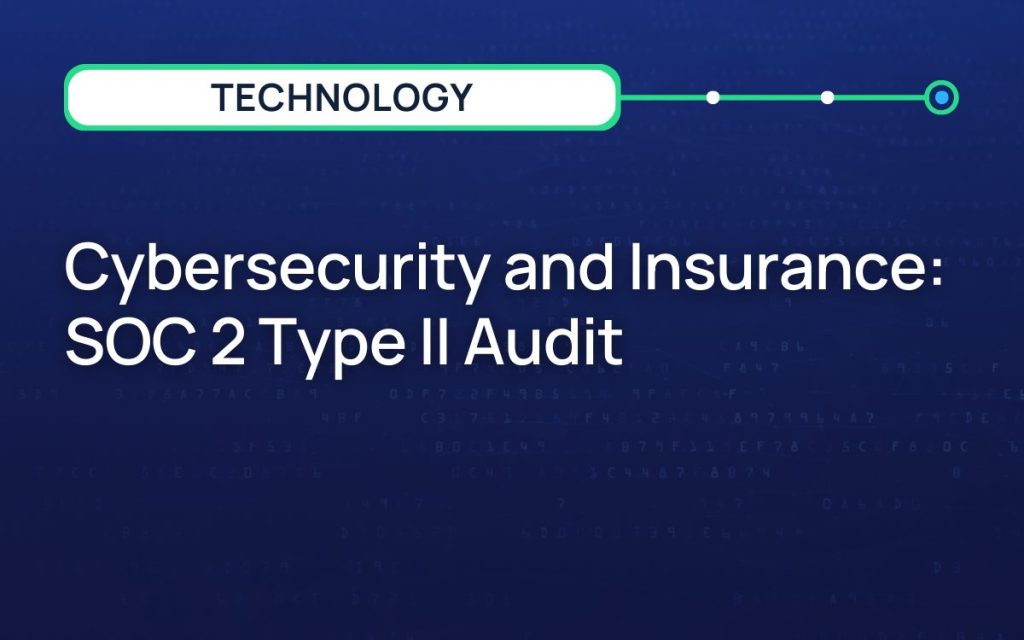Cybersecurity and Insurance: SOC2 Type II Audit

In the dynamic and data-driven world of insurance, safeguarding sensitive information is paramount. Consumers entrust insurance carriers with a wealth of personal, financial, and confidential data, making data security and compliance critical components of their operations. That’s where SOC2 comes into play – a powerful framework designed to help insurance carriers navigate the complex landscape of data protection and regulatory compliance. Let’s explore SOC2 and its significance and relevance to insurance carriers.
What is a SOC2 audit?
A SOC2 Type 2 audit assesses an organization’s controls and processes related to security, availability, processing integrity, confidentiality, and privacy. Auditors conduct the assessment in accordance with the American Institute of Certified Public Accountants (AICPA) Trust Services Criteria (TSC). SOC stands for “Service Organization Control,” and it’s part of a series of standards and reports insurance and other industries use to evaluate the effectiveness of controls at service organizations.
The audit evaluates the organization’s controls and processes against one or more of the five Trust Services Criteria (TSC):
- Security: Measures the organization’s ability to protect sensitive data and systems against unauthorized access, breaches, and potential threats.
- Availability: Assesses the organization’s ability to ensure its services are available and operational when needed.
- Processing Integrity: Focuses on the accuracy and completeness of data processing.
- Confidentiality: Evaluates how the organization protects confidential information from unauthorized access or disclosure.
- Privacy: Assesses how the organization handles personal information and complies with relevant privacy regulations.
All audits include evaluation of Security controls, and organizations can choose additional TSC to be evaluated against based on what’s relevant to their business and important to their customers.
What is the difference between a SOC2 Type II and a SOC2 Type I?
A SOC2 Type I report assesses a service organization’s controls at a specific point in time, focusing on whether these controls are designed effectively to meet the TSC. It offers a snapshot of the control environment’s design.
In contrast, a SOC2 Type II report assesses both the design and operational effectiveness of controls over a defined period, typically six to twelve months. This type of report not only examines whether controls are appropriately designed but also assesses how consistently they function during the evaluation period. Consequently, Type II reports offer more comprehensive and ongoing assurance about a service organization’s ability to safeguard data and ensure the reliability of its services. As a result, Type II reports are often more valuable for customers and partners looking for a deeper understanding of a service provider’s control environment and effectiveness, but Type I reports are still valuable for initial assessments, vendor selection, compliance, and risk evaluation purposes.
Why did AgentSync complete a SOC2 Type II?
Completing a SOC2 audit and committing to annual assessments is a vital step in our ongoing journey to provide our valued customers with the highest level of data security and trust. We understand that customer confidence in us is paramount, especially in an era when data protection is more critical than ever.
By subjecting our controls to rigorous examination and scrutiny, we ensure that we not only meet but exceed industry standards in the security and availability of our products. Going forward, these annual audits will serve as a continuous improvement process, allowing us to adapt to evolving threats and technologies. Customer trust is the cornerstone of our relationship, and our dedication to transparency and security reaffirms our promise to protect what matters most to our customers.
What criteria matter most in a SOC2 Type II?
Security is the most crucial criteria in SOC2 because it provides a solid foundation for the entire framework. Without robust security measures in place, it becomes challenging to achieve and sustain compliance with the other TSCs.
.
Security controls serve as the bedrock for safeguarding sensitive data from unauthorized access, disclosure, alteration, or destruction. The repercussions of data breaches and security incidents can be severe, including financial losses, legal liabilities, reputational harm, and regulatory penalties.
Security also plays a pivotal role in building and preserving client trust. Customers, partners, and stakeholders entrust organizations with their data, and strong security practices signify a commitment to the protection of sensitive information. Security controls arevital for ensuring operational continuity by minimizing disruptions caused by security incidents, thereby upholding the reliability and availability of services.
As the threat landscape continues to evolve, with new cybersecurity risks emerging regularly, prioritizing security ensures organizations remain vigilant in addressing emerging vulnerabilities and risks. Security’s importance in SOC2 stems from its pivotal role in data protection, regulatory compliance, trust-building, and the overall integrity of the framework.
Why your partners’ SOC2 Type II audit history should matter to insurance carriers
Insurance carriers handle vast amounts of sensitive customer data, including personal and financial information, making data security and privacy crucial. Choosing vendors with SOC2 reports is important for several reasons:
- Data Protection: SOC2 reports assess a vendor’s controls related to security, confidentiality, and privacy. Insurance carriers can be confident that vendors with SOC2 reports have robust measures in place to protect sensitive data, reducing the risk of data breaches and associated liabilities.
- Regulatory Compliance: The insurance industry is subject to stringent regulations, such as HIPAA and state-specific data protection laws. Partnering with SOC2-compliant vendors helps carriers ensure compliance with these regulations, avoiding potential legal and financial penalties.
- Client Trust: Customers trust insurance carriers with their personal information. Partnering with vendors that undergo SOC2 audits demonstrates a commitment to safeguarding customer data, enhancing trust and credibility with policyholders.
- Risk Mitigation: SOC2 reports provide insights into a vendor’s control environment. Insurance carriers can assess the risk associated with their vendors and take proactive steps to mitigate risks that could impact their operations or reputation.
- Operational Continuity: Availability is one of the Trust Services Criteria in SOC2. Insurance carriers rely on vendors for critical services. SOC2 reports help carriers evaluate a vendor’s ability to maintain operational continuity, ensuring that services remain accessible and dependable.
- Competitive Advantage: Demonstrating a commitment to data security and privacy through vendor selection can be a competitive advantage. Carriers can use SOC2 compliance as a selling point to attract customers who prioritize data protection.
- Efficiency: Working with SOC2-compliant vendors can streamline the due diligence process. Carriers can more readily assess a vendor’s controls, reducing the time and effort required for vendor evaluations.
- Risk Transfer: Insurance carriers often transfer risk through reinsurance or other risk-sharing mechanisms. Ensuring that vendors have strong controls can minimize the potential for claims related to vendor-related security incidents.
Choosing vendors with SOC2 reports is essential for insurance carriers to protect customer data, maintain compliance, build trust, mitigate risks, and enhance operational efficiency. It’s a proactive approach to safeguarding data and maintaining the integrity and reputation of the insurance business. Looking for more support? Schedule a demo today.

